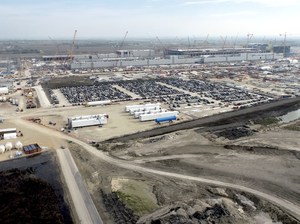
Not so long ago, the data on Austin startup funding created an image of a land of milk and honey.
The year was 2021. And as each new quarter came into view, the bar charts climbed higher as the total amount of money being invested in Austin-based startups essentially doubled from just under a billion annually to over $2 billion.
That high water mark might stand for some time.
Since then, interest rates, inflation and war have culled investors' ambition significantly. Still, the data isn't screaming doom and gloom.
Yes, it's much more difficult for startups to secure big funding rounds at high valuations. But, at least in Austin, the availability of funding is far better than it was before the word "Covid" became part of our vocabulary. And many of the area's top venture firms secured hundreds of millions of dollars to invest in startups before market conditions faltered.
A new report by venture tracking firm PitchBook and industry organization the National Venture Capital Association tallies funding totals from the last quarter of 2023. It shows Austin startup funding rebounded somewhat compared to the third quarter, which was the metro area’s worst quarter since the second quarter of 2019.
Local startups raised $1.1 billion across 126 deals in the 2023 fourth quarter. That’s the best deal count since the high-water mark of 163 deals in the first quarter of 2021. The dollar amount is also higher than what Austin typically saw before the boom days of 2021.
But dollar figures can be misleading, said Krishna Srinivasan, a longtime Austin venture capitalist who co-founded LiveOak Venture Partners. For example, a significant chunk of reported funding deals are actually transactions between investors where one firm buys in and another cashes out.
While we've come off the mountain of 2021, Srinivasan said his firm was busy making deals in the fourth quarter that will likely become public early this year. And, while he notes there's more focus on fundamentals and less focus on growth at all costs now than a few years ago, he's bullish on 2024. A big part of that, he said, is that cutbacks at big tech companies are quickly translating to more experienced technologists available to launch their own startups or get hired by one that's still in its early stages.
"It's a glorious time to start companies, given the talent availability and so on," he said. "So I hope entrepreneurs don't feel too concerned that venture guys don't want to do deals, and I think there is more eagerness and more enthusiasm to do deals more than ever before."
That's not to say everything is perfect in startup land.
Some later-stage companies that raised big funding rounds in and around 2021 have over-hired and will likely have a tough time raising new funding at the valuations they had during the boom years. That can translate into layoffs and smaller funding deals at lower valuations.
Meanwhile, acquisitions, which help fuel the ecosystem with payouts to investors and founders, have also slumped a bit.
While public data rarely reflects the reality of startup merger and acquisition activity, largely because private transactions often never come to light, it's clear that exits have been fewer and farther between in recent quarters. For example, the Austin metro area logged only four exits in the fourth quarter, with no dollar figures attached to them. That’s roughly on par with the past year or two, but a far cry from the $1 billion to $9 billion in exits the area was recording during the frothy 2020-22 range.

Some of that can be attributed to private equity firms taking a step back from their acquisition efforts, and it's a trend impacting the whole nation, Srinivasan said.
"People have been focused much more on their existing portfolio. So, overall, PE buyers have been largely absent in the market," he said. "So that takes away a big chunk of important exit players."
Startups, meanwhile, might not be as excited to be bought out given that the multiples have gone down significantly due to macro market conditions, he said.
"There is a little bit of the self-selection of good companies not in wanting to transact at this time until market conditions are more favorable for them to fetch a higher price here," he said. "So it's a lot of things going on in 2023."
It’s also worth noting that a few big deals can skew the quarterly venture funding numbers from quarter to quarter. For example, in the fourth quarter last year, about half of the $1.1 billion total came from the metro area's two biggest deals – $300 million for Firefly Aerospace and $200 million for Infinitum.
The PitchBook-NVCA report also shows that, on a national and global scale, early funding is down across the board, which is a troubling sign for new founders.
"In 2023, the combined deal value of pre-seed and seed experienced a sharp YoY decline, slipping from $24.2 billion to $14.6 billion," the report says. "This phenomenon is partially attributable to a pullback of large investors from the seed stage as the market gradually adapts to 'a new normal' following the 2021 capital exuberance."
But, in its executive summary, the report echoes the optimism voiced by venture firms.
"Deal, fundraising, and exit activity were all down, and with few exceptions, deal values were down as well," it said. "While the continued drop in activity does not lend itself to optimism, it would be a mistake to declare the market in crisis."







